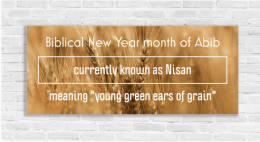- Main Page
- Torah Readings
- Holiday & Monthly commentary from Min. Garrett
- Weekly drash from Jonathan
- Weekly parashah commentary from Min. Garrett
- Contact Us
- Membership
- Mission and Vision Statements
- Statements of Belief
- Books
- Articles by Min. Garrett
- Other Ministries
- Music Links
- Morning Prayers
- CAP/USAF News
- Jewish Calendar and Jewish History
Skip to content
On Adar we have Esther and
Posts in Category: From the President
Min. Dr. Donald H. Garrett
counting/reel/749946477617076
On August 8, 2025 0 Comments
- From the President
https://www.facebook.com/reel/749946477617076
Abiyb/Nissan
On November 2, 2024 0 Comments
- From the President
Abiyb/Nissan

Abiyb (Abib) is the name of the 1st month established by YaHVaH in Exodus 13:3-4, “Moses [Mosheh] said to the people, “”Remember this day on which you departed from Egypt [Mitzrayim], from the house of bondage, for with a strong hand God [Elohiym] removed you from here, and therefore chametz may not be eaten. Today you are leaving in the month of Abib [Abiyb].” by referencing Exodus 12:1-2, “Hashem [YaHVaH] said to Moses [Mosheh] and Aaron [Aharon] in the land of Egypt [Mitzrayim], saying, “”This month shall be for you the beginning of the months, it shall be for you the first of the months of the year,” (Tanach, Stone edition), words in [ ] are the actual Hebrew words in the text.
Lubavitch Rabbi Menachem Posner describes in Why Babylonian Names for Jewish Months? that in pre-Babylonian era there were only four months listed in Scripture: Abiyb, Ziv, Eythanim, and Bul. And even these names have been changed to Nissan, Iyyar, Tishrei, and Cheshvan respectively. He further states the Jerusalem Talmud says the names came up from Babylon around 350 BCE.
He concludes with “The original system was to count months in numeric order, starting from Nissan. Thus, any time a person mentioned a month, he was in effect recalling the exodus from Egypt: we are in, say, the sixth month—six months since the month of the Exodus. Thus, the numeric naming served as a constant reminder of our deliverance from Egypt.
After we were delivered from Babylonian captivity, however, we started using the names that we became used to using in Babylon. And now, these names served to remind us that G‑d has redeemed us from this second exile.” (© Copyright Chabad.org and Menachem Posner, all rights reserved.)
It is not until the books of Esther and Nehemiah that we see the name of Nissan used for the first month. Esther are during the rule of the Persian King Ahasuerus. Esther 3:7 says, “In the first month, which is the month of Nissan, in the twelfth year of the reign of King Ahauerus, …” (Tanach, Stone edition). Nehemiah is during the rule of King Artaxerxes. Nehemiah 2:1 says, “It happened in the month of Nissan of the twentieth year of King Artaxerxes, that wine was brought before him. I (Nehemiah) carried the wine and gave it to the king. I had never before appeared downcast in his presence” (Tanach, Stone edition).
Today, the Hebrew calendar uses the name Nissan instead of Abiyb.
© Copyright 11/2/2024, Minister Donald H Garrett and Odon Obadyah Ministries, Inc.©
Adar
On February 3, 2024 0 Comments
- From the President
Adar

Adar is the last month in the Jewish calendar, but it is also a leap year month. Seven times out of a 19-year cycle, Adar becomes Adar 1 and Adar 2, the first one being the insertion month and the last equivalent to the normal Adar month. These leap years are called שנה מאוברת (pregnant year).
From Chabad, “Adar is the official “happy month,” as is written: “As soon as Adar begins, increase in joy!” In a leap year, we have two months of extra happiness!” Adar is usually translated as glorious or honorable.
However, Adar can also mean FIRE  though the Hebrew word ‘Esh אֵשׁ is generally used for fire.
though the Hebrew word ‘Esh אֵשׁ is generally used for fire.
On Adar we have Esther and  Purim, a happy celebration of deliverance from the evil Haman of the Persian Empire in the past because of Queen Esther. We recite the following blessing, “Blessed are You, YaHVaH, Eloheynu, King of the universe, Who has kept us alive, sustained us and brought us to this season.”
Purim, a happy celebration of deliverance from the evil Haman of the Persian Empire in the past because of Queen Esther. We recite the following blessing, “Blessed are You, YaHVaH, Eloheynu, King of the universe, Who has kept us alive, sustained us and brought us to this season.”

Simcha in the Shtetl – By Chaim Leib Zernitsky
Adar 1, the insertion month, is nothing special. All functions and celebrations of Adar will be done in Adar 2
© Copyright 2024, 2025, Odon Obadyah Ministries, Inc. and Min. Donald H. Garrett.
Hanukkah Readings Day 1
On December 16, 2023 0 Comments
- From the President

Day 1: Numbers 7:1-17
Chapter 7, “1 It was on the day that Mosheh finished erecting the Tabernacle that he anointed it, sanctified it and all its utensils, and the Altar and all its utensils, and he had anointed and sanctified them. 2 The leaders of Israel, the heads of their fathers household, brought offerings: they were the leaders of the tribes, they were those who stand at the countings. 3 They brought their offering before YaHVaH; six covered wagons and twelve oxen – a wagon for each two leaders and an ox for each – and they brought them before the Tabernacle. 4 YaHVaH said to Mosheh, 5 “Take from them, and they shall be to perform the work of the Tent of Meeting; you shall give them to the Levites, each man according to his work.” 6 So Mosheh took the wagons and the oxen and gave them to the Levites. 7 Two of the wagons and four of the oxen he gave to the sons of Gershon, in accordance with their work. 8 And four of the wagons and eight of the oxen he gave to the sons of Merari, in accordance with their work, under the authority of Ithamar, son of Aharon the Kohen. 9 And to the sons of Kohath he did not give; since the sacred service was upon them, they carried on the shoulder. 10 Then the leaders brought forward offerings for the dedication of the Altar on the day it was anointed, and the leaders brought their offering before the Altar. 11 YaHVaH said to Mosheh, “One leader each day, one leader each day shall they bring their offering to the dedication of the Altar.” 12 The one who brought his offering on the first day was Nachshon son of Amminadab, of the tribe of Yehudah. 13 His offering was: one silver bowl, its weight a hundred and thirty [shekels]; and one silver basin of seventy shekels in the sacred shekel; both of them filled with fine flour mixed with oil for a meal-offering; 14 one gold ladle of ten [shekels] filled with incense; 15 one young bull, one ram, one sheep in its first year for a burnt-offering; 16 one he-goat for a sin-offering; 17 and for a feast peace-offering: two cattle, five rams, five he-goats, five sheep in their first year – this is the offering of Nachshon son of Amminadab.” (Tanach, Stone Edition). Note: Names in bold blue text have been changed from actual English text to proper spelling according to the Hebrew text.
1 Maccabees 2:19-22, 27-28; 4:52-59
Chapter 2, “19 Then Mattathias answered and spake with a loud voice, Though all the nations that are under the king’s dominion obey him, and fall away every one from the religion of their fathers, and give consent to his commandments: 20 Yet will I and my sons and my brethren walk in the covenant of our fathers. 21 God forbid that we should forsake the law and the ordinances. 22 We will not hearken to the king’s words, to go from our religion, either on the right hand, or the left. … 27 And Mattathias cried throughout the city with a loud voice, saying, Whosoever is zealous for the law, and maintaineth the covenant, let him follow me. 28 So he and his sons fled into the mountains, and left all that ever they had in the city.” (Apocrypha, Authorized (King James) Version).
Chapter 4, “52 Now on the five and twentieth day of the ninth month, which is called the month Casleu כִּסְלֵו [Kislev], in the hundred forty and eighth hear, they rose up betimes in the morning, 53 And offered sacrifice according to the law upon the new altar of burnt offerings, which they had made. 54 Look, at what time and what day the heathen had profaned it, even in that was it dedicated with songs, and citherns, and harps, and cymbals. 55 Then all the people fell upon their faces, worshipping and praising the God of heaven, who had given them good success. 56 And so they kept the dedication of the altar eight days, and offered burnt offerings with gladness, and sacrificed the sacrifice of deliverance and praise. 57 They decked also the forefront of the temple with crowns of gold, and with shields; and the gates and the chambers they renewed, and hanged doors upon them. 58 Thus was there very great gladness among the people, for that the reproach of the heathen was put away. 59 Moreover Judas and his brethren with the whole congregation of Israel ordained, that the days of the dedication of the altar should be kept in their season from year to year by the space of eight days, from the five and twentieth day of the month Casleu כִּסְלֵו [Kislev], with mirth and gladness.” (Apocrypha, Authorized (King James) Version).
and 2 Maccabees 1: 9,18
Chapter 1, “9 And now see that you keep the feast of tabernacles in the month Casleu כִּסְלֵו [Kislev].” “18 Therefore whereas we are now purposed to keep the purification of the temple upon the five and twentieth day of the month Casleu כִּסְלֵו [Kislev], we thought it necessary to certify you thereof, that ye also might keep it, as the feast of tabernacles, and of the fire, which was given us when Neemias offered sacrifice, after that he had builded the temple and altar.” (Apocrypha, Authorized (King James) Version).
© Copyright December 2024, Odon Obadyah Ministries, Inc. and Min. Donald H. Garrett
YaHVaH is Your Refuge
On October 20, 2023 0 Comments
- From the President
YaHVaH is Your Refuge
From the Outreach Minister Virginia Garrett
Psalm 91:7-9
יִפֹּ֤ל מִצִּדְּךָ֨ ׀ אֶ֗לֶף וּרְבָבָ֥ה מִימִינֶ֑ךָ אֵ֝לֶ֗יךָ לֹ֣א יִגָּֽשׁ׃
A thousand may fall at your left side,
ten thousand at your right,
but it shall not reach you.
רַ֭ק בְּעֵינֶ֣יךָ תַבִּ֑יט וְשִׁלֻּמַ֖ת רְשָׁעִ֣ים תִּרְאֶֽה׃
You will see it with your eyes,
you will witness the punishment of the wicked.
כִּֽי־אַתָּ֣ה יְהֹוָ֣ה מַחְסִ֑י עֶ֝לְי֗וֹן שַׂ֣מְתָּ מְעוֹנֶֽךָ׃
Because you took YaHVaH as your refuge, the Most High—as your habitation
Trust in YAHVAH! Call on Him in your hour of need. He is there for you now and always.







